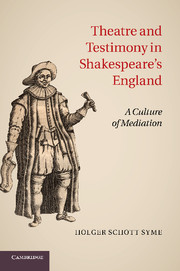Book contents
- Frontmatter
- Contents
- Illustrations
- Acknowledgments
- Textual note
- Abbreviations
- Introduction: The authenticity of mediation
- Chapter 1 Trial representations
- Chapter 2 Judicial digest
- Chapter 3 Performance anxiety
- Chapter 4 Royal depositions
- Chapter 5 The reporter’s presence
- Epilogue: The theatre of the twice-told tale
- Select bibliography
- Index
- References
Epilogue: The theatre of the twice-told tale
Published online by Cambridge University Press: 05 March 2012
- Frontmatter
- Contents
- Illustrations
- Acknowledgments
- Textual note
- Abbreviations
- Introduction: The authenticity of mediation
- Chapter 1 Trial representations
- Chapter 2 Judicial digest
- Chapter 3 Performance anxiety
- Chapter 4 Royal depositions
- Chapter 5 The reporter’s presence
- Epilogue: The theatre of the twice-told tale
- Select bibliography
- Index
- References
Summary
One of the very first references to Shakespeare’s plays appears in an account of the 1594 Christmas Revels at Gray’s Inn, the Gesta Grayorum: ‘A Comedy of Errors . . . was played by the Players’. As the narrator recalls, the comedy was much ‘like to Plautus his Menechmus’. Identifying the sources of plays was neither unusual nor derogatory. In a diary entry of 1602, John Manningham described a performance at the Middle Temple in very similar terms: ‘at our feast wee had a play called “Twelue Night, or What You Will”, much like the Commedy of Errores or Menechmi in Plautus, but most like and neere to that in Italian called Inganni’. Encountering fictions or histories one already knew on stage was doubtless a common experience. Many of the theatregoers who saw The Winter’s Tale on stage in 1611, for instance, might have recognized the plot, given its close adherence to the story of Robert Greene’s Pandosto – a book of astonishingly abiding popularity, reprinted twenty-five times in the course of the seventeenth century with three editions in the years preceding Shakespeare’s play (1600, 1607, and 1609).
I cite these examples to make two closely related points, the implications of which I will briefly sketch as an epilogue to this study. As is immediately clear from the two Inns of Court performance records, plays in early modern England functioned, at least in part, as reports – again in the literal sense I used earlier. One of the pleasures of watching a comedy like Twelfth Night was that it brought back memories of seeing or reading other, similar plays – in Manningham’s case, plays from two different literary traditions. This, then, is my first, simple point: plays themselves frequently were reports, and reports of precisely the kind I have been studying here – multiply authorized, textually constituted but aiming for vocalization and embodiment. I have argued throughout this book that theatrical performances in the period relied simultaneously on presence and representation, on identity and alienation, on an authenticity grounded in strategic inauthenticity. But beyond these theatrical strategies of conjuring up a sense of presence by gesturing elsewhere, early modern dramatic texts likewise insist on their own mediating function, even as they frequently anticipate the mediating action that will bring them to life on stage.
- Type
- Chapter
- Information
- Theatre and Testimony in Shakespeare's EnglandA Culture of Mediation, pp. 257 - 265Publisher: Cambridge University PressPrint publication year: 2011



